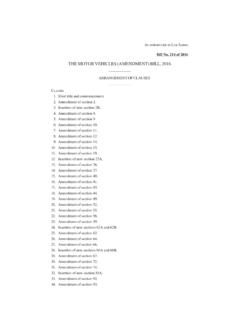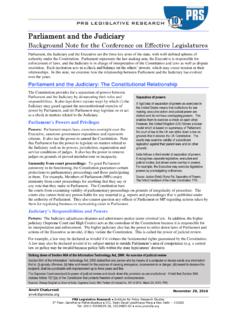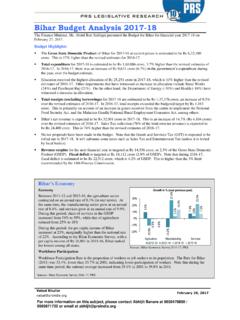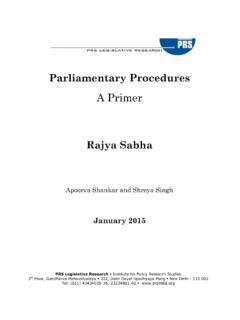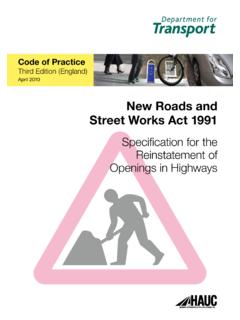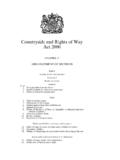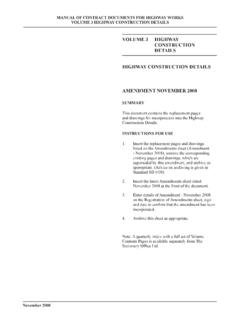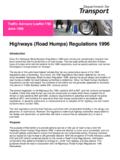Transcription of The Draft Bill20i-vi
1 DraftRegulatory Reform Bill, 20**Published byThe Secretariat for the Committee on InfrastructurePlanning Commission, Government of IndiaYojana Bhawan, Parliament StreetNewDelhi-110 2009 Government of IndiaContentsPagesPrefacevThe Regulatory Reform Bill, 20**1 PART title, extent and IICONSTITUTION AND PROCEEDINGS OF REGULATORY COMMISSION AND APPELLATE of regulatory commissions and appellate and appointment of for appointment of of office and of and of the regulatory commission and appellate etc. not to invalidate proceedings11 PART IIIPOWERS AND FUNCTIONS OFREGULATORY of regulatory powers of the regulatory to require evidence to require statistics and to the regulatory by the regulatory of register18 PART I VFUND AND of the regulatory commission and appellate of the regulatory commissions and appellate of the regulatory commissions and appellate of to Borrow21 PART on unauthorized from of for Grant of of relating to open of of of utilities of of utility in where no purchase takes to of licence and sale of of enforcement for securing requirements34 PART
2 Regulations37 PART VIICONSUMER Advisory Committee39 PART competitive domination and anti-competitive to the Competition Commission41 PART IX DISPUTE resolution by the against orders of the regulatory commission43 PART to State of entry court not to have of action taken in good , officers etc. to act as public of sums of notices, orders or of the government to make of regulatory commission to make of appellate tribunal to make and regulations to be laid in to remove and saving51 SCEHDULE 1525 PerfaceAfter a series of wide ranging consultations with experts andstakeholders, the Government published a paper titled Approach toRegulation of Infrastructure.
3 It analyses the current state of economicregulation and suggests an overarching framework with a view toaddressing the divergent mandates and practices prevailing in differentsectors. The Approach Paper underscores the need to establish a levelplaying field wherever the industry structure is amenable tocompetition. It recommends sound regulatory principles and practiceswhere monopoly services are to be Approach Paper identifies some general principles whichare critical to the institutional design of regulation in the context ofvalues enshrined in the Constitution. The principle of separation ofpowers among the three branches of government would have to becomplied with.
4 This would require rule making and enforcementfunctions to be separated from judicial functions which may be vestedin Appellate Tribunals. To secure democratic accountability, theregulator should be directly responsible to the legislature and to thepeople at large. Moreover, a fair and transparent process for selectionof regulators would need to be reinforced through statutory provisionswith a view to ensuring that the regulatory system remains insulatedfrom interference and of an agreed philosophy of regulation would requirelegislative action with a view to addressing the diverse provisions insector-specific enactments.
5 The Approach Paper, therefore, suggestsan overarching law for giving effect to the agreed principles ofregulation and for guiding the next stage of regulatory facilitate an informed debate, a Draft Bill has been prepared togive effect to the recommendations contained in the Approach a broad consensus emerges from further consultations, the draftBill could be considered for enactment with a view to adopting aconsistent approach to regulation across key provisions of the Draft Bill include an institutionalframework for regulatory commissions, their role and functions,accountability to the legislature and interface with the markets andthe people.
6 The proposed statute, if enacted, would supplement theexisting sector-specific laws that set out sectoral objectives. Thesectors to which the Draft Bill applies include electricity, oil, gas andcoal, telecommunications and internet, broadcasting and cable ,posts, airports, ports and inland waterways, railways, Mass RapidTransportation Systems, highways, water supply and need for such an initiative arises because economicliberalization has distanced the relationship between State ownershipand the responsibility for providing infrastructure services, ascompared to the earlier arrangement where infrastructure was providedalmost exclusively by the public sector.
7 This has ushered in a gradualshift towards private investment in infrastructure services whereindependent regulation assumes a critical Draft Bill is being placed in public domain for elicitingviews and opinions on the nature and extent of legislative actionnecessary for reforming the regulation of key infrastructure services.(Gajendra Haldea)Adviser to Deputy ChairmanApril 8, 2009 Planning CommissionThe Regulatory Reform Bill 20** 1 Draft for DiscussionThe Regulatory Reform Bill, 20**An Act to govern the constitution, powers and functioning of the regulatory commissions for publicutilities and generally for taking measures conducive to development of public utility industries,determination of tariff, enforcement of performance standards, promoting investment and competitionand for protecting the interests of consumers and for matters connected therewith or it enacted by Parliament in the ** Year of the Republic of India as follows.
8 PART IPRELIMINARYS hort title, extent and commencement1.(1)This Act may be called the Regulatory Reform Act, 20**.(2)It shall come into force on such date as the Central Government may, by notification,appoint:Provided that different dates may be appointed for different provisions of this Act andany reference in any such provision to the commencement of this Act shall be construed as areference to the coming into force of that this Act, unless the context otherwise requires,(1) annual plan means annual plan prepared under sub section (3) of section 16 ofthis Act;(2) annual report means annual report prepared under sub section (2) of section 16of this Act.
9 (3) appellate tribunal means an appellate tribunal referred to in section 3 of thisAct;(4) applicable law means an Act that governs any specific public utility industry.(5) appointed date means the date referred to in sub section (2) of Section 1;(6) board means the board constituted under the applicable law in relation to thepublic utility industry;(7) carriage means fixed assets or infrastructure that is used for carrying any goodsor services and includes electricity transmission and distribution networks, telephonynetworks, pipelines, highways, port terminals, railways and airports.
10 2 The Regulatory Reform Bill 20** Draft for Discussion(8) chairperson means the chairperson of a regulatory commission or appellatetribunal, as the case may be;(9) content means the goods or services that are transmitted or transported by meansof the carriage and includes electricity, voice, oil and gas;(10) company means a company formed and registered under the Companies Act,1956 and includes any body corporate under a Central, State or Provincial Act; (11) consumer means any person who buys or avails of any goods or services as thecase may be, for a consideration which has been paid or promised or partly paidand partly promised, or under any system of deferred payment and includes-(i)
